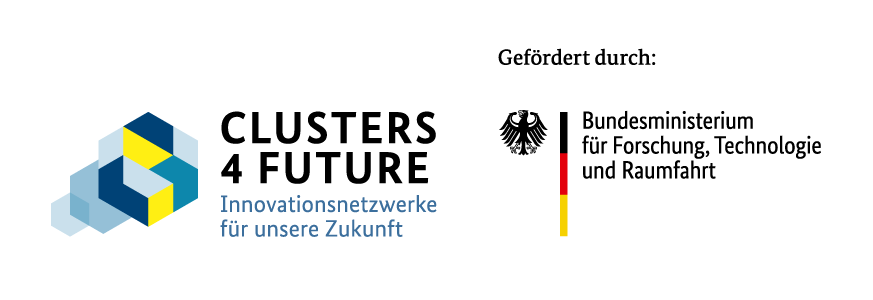As future clusters, we are Germany's innovation networks of the future. We all have the ambition to quickly find suitable solutions for the major challenges of our time. The topics are as varied as the concepts: Mobility innovations, neuromorphic hardware for autonomous systems, personalized cell and gene therapy processes, sustainable marine research, quantum technology, new approaches to drug development and hydrogen.
On Tuesday, 31.05.22, the Federal Ministry of Education and Research (BMBF) and the Project Management Jülich (PtJ) the seven future clusters of the Cluster4Future Initiative were invited to an initial personal meeting. The event took place in the Alexander von Humboldt Room of the BMBF at Kapelle-Ufer 1 in Berlin with representatives of the seven future clusters.
Ina Schieferdecker (Head of the BMBF's "Research for Digitalization and Innovation" department) and Dr. Florian Welter (Team Leader of the PtJ's "Future Cluster Initiative"), there was a short round of introductions of all seven future clusters (MCube, NeuroSys, OTC Rostock, PROXIDRUGSQSens, SaxoCell and Hydrogen). It was very exciting to learn more about the research content of the other clusters.
There were several interesting sessions throughout the day.
Our conclusion: We want to network and exchange ideas more closely with the other clusters in future, as there are many common research topics despite the different fields of innovation. We are already looking forward to working together and the next meeting.
Where to put cars, bicycles and e-scooters - and how do we organize parking space fairly, efficiently and sustainably?
How can mobility data and simulations make cities more liveable - and make change visible and tangible?
The MCube Consulting study shows how the Olympic Games could have a sustainable impact on Munich in terms of sport, society and the environment - something that has already been picked up on by many media outlets.
Munich is considering an Olympic bid - our study shows what opportunities and challenges the Games could bring for the economy, environment and society.
How do we want to move tomorrow? This question was the focus of the Citizens Lab at Marienplatz for six days.
The visual utopian Jan Kamensky presented his latest vision in cooperation with the Munich S-Bahn.
Carolin Zimmer from the Chair of Settlement Structure and Transport Planning and Sebastian Preiß from the Hans Sauer Foundation explain in an interview what the project has achieved and what makes it special.
Major award for a strong team: MCube Consulting receives the Innovation Award of the City of Munich - for a solution that reduces administrative workload, improves security and shows how research enables real change.
If Munich bids for the Olympics again, it will not do so arbitrarily - but with vision, attitude and a clear plan.
MCube had its own stand at the trade fair and brought together over 100 mobility pioneers at the "Bridging City Innovation Ecosystems" event above the rooftops of Barcelona.
No results available

What is MOSAIQ?
Imagine something: There is more space for people. The streets have more trees and plants. Everyone can get around better. That's how your Schwabing-West district could be in the future. How would you like your district to be? We want to talk to you about it!
The project is called MOSAIQ. MOSAIQ is a research∙project. MOSAIQ means: Mobility and urban climate in the future city∙part. The Technical University of Munich is leading the project.
What is MOSAIQ about?
MOSAIQ wants to make the streets in the city∙part more beautiful. People should feel comfortable there. There should be more space. For meetings and plants, for example. You can help decide what is tried out in the Stadt∙teil. The ideas come from you. Some ideas will be tried out on the streets for a certain period of time.
The aim of MOSAIQ is to make urban districts good places to live.
At the same time, the climate in the city should improve. And people should be able to move around the city easily.
What is happening in the district?